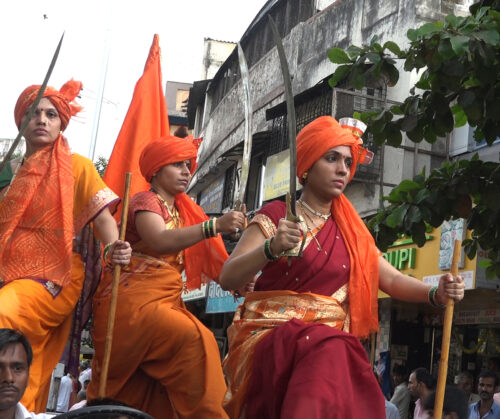43rd Toronto International Film Festival
Day 4: Voice of Reason
Why watching an Indian documentary at an international film festival makes perfect sense.
Shubhra Gupta | Sept 11, 2018

The choice of watching an Indian film at an international film festival, especially TIFF, which has some of the hottest Hollywood tickets beginning their Oscar journey, can be seen as weird. And even more so when the film in question is an intimidating four hours and 20 minutes long.
And yet, the choice is clear when it comes to being able to catch Anand Patwardhan’s documentary Vivek (Reason is the English title) at its premier at the Toronto International Film Festival (TIFF). Because this one, like almost all the other films (Ram Ke Naam, Father, Son and Holy War) that Patwardhan has made, may find it impossible to get a public screening in the land of its origin. Or have to battle long and hard with the censors and extra-constitutional authorities before it gets an airing.
It’s not as if we are unaware of the events in Patwardhan’s searing, powerful documentary, some recreated for dramatic purposes, some shot in real time with the kinetic urgency of the handheld camera. A clear-eyed inquiry into the rise of the hardline Hindutva, and the alarmingly swift rise of its apologists and accompanists, is not something we see these days: the current dispensation does not take kindly to questions or challenges.
To see it all strung together, spread over eight ‘chapters’ and four and more urgent, chilling hours, is a shocker. Because it is easy to forget what we are not allowed to see. And forgetting is not an option.
In the film, we get glimpses into the secretive workings of the organisations (Sanatan Sanstha) spreading the message of one-nation-one-religion, and connecting nationalism and patriotism. Shattered family members of murdered rationalists like Dabholkar and Pansare are interviewed. So are the mother, brother and friends of Rohit Vemula, the Dalit scholar who committed suicide. We see the surviving son of the Muslim who was lynched merely on suspicion that the meat in his house was beef. It was not. Tests proved it was mutton. But no one is listening. The young son’s face, as he recounts the horror, is stamped with residual, lasting grief. It will stay with you.
The rise of Dalit voices is again something that most of the mainstream media takes cognizance of, with a shocking degree of reluctance. Patwardhan’s lifelong engagement with people on the margins is visible in the empathy he brings to bear through the film, even when he is eliciting contrarian views in order to show them up for what they are: brimming with anti-minority sentiments, exposing their hatred and bigotry with state-sanctioned impunity.
In voiceover, Patwardhan defines Hinduism as ‘a dynamic composite of indigenous cultural practices combined with those borrowed over the ages with passing streams. Sanatan Vedic Hindutva, on the other hand, is a Brahmanical project of supremacy, which recruits the powerless in an endless war against imaginary demons.’
The film flags in its last chapter, when Patwardhan focuses on the rise of ‘Hindu terror’, going back to the night of the 2008 Mumbai attack, when the head of ATS, Hemant Karkare, who was investigating the Malegaon blasts, was killed. But that’s a minor quibble. Vivek stands tall for what it manages to piece together: a portrayal of India today, and how it is a country on the edge of an abyss. Will we find our reason, or have we lost it irrevocably?
The night that Mumbai was attacked by armed gunmen is the subject of Hotel Mumbai, also premiered at TIFF. Writer-director Anthony Maras’s dramatization of the attacks is yet another in the list of movies which show you what-happened-that-night. It plays out like a tense thriller, as the action moves from one location to the other — a train station, a café, a five star hotel. It stars Anupam Kher as a brave chef, Arnie Hammer as a trying-to-stay-calm-guest, Dev Patel as a courageous rookie, among others. We know the people these actors are playing, and yet, as the bullets fly, and the bodies drop, you can’t help wonder: just what is the purpose of this film?
There is no such doubt while watching Vivek.